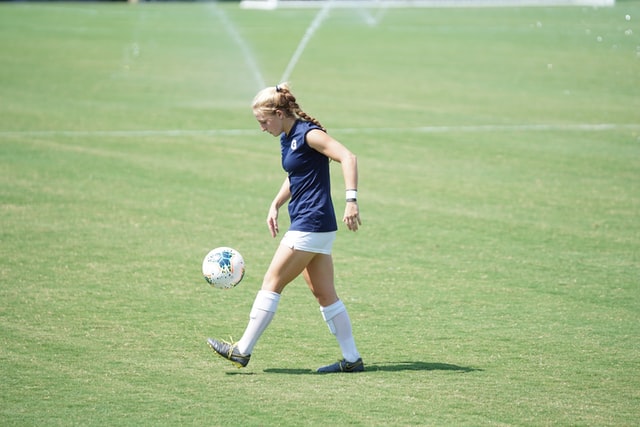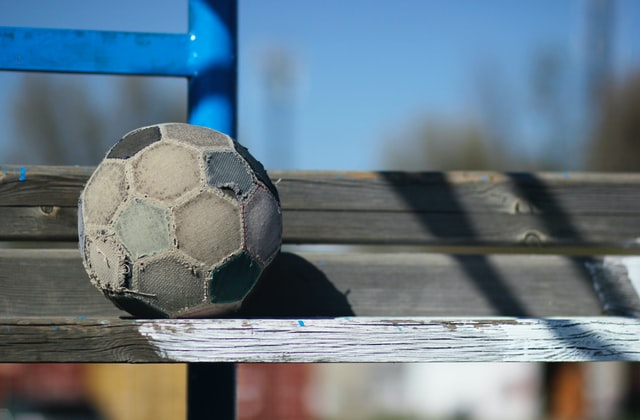Having a soccer ball that lasts forever is something that we all wish for. However, almost everything has an expiry date, and a soccer ball is no exception.
There will come a day when your soccer ball is no longer usable, but the question is, when exactly is that going to happen?
Or in other words, how long can you expect your new soccer ball to last?
There is no one answer that fits all when it comes to how long your soccer ball will last. However, you can expect your soccer ball to last somewhere between 2 months to a few years depending on the materials of the soccer ball, and how much you take care of the ball.
I know, that’s a huge range, but there are thousands of factors that come into play when we are talking about the lifetime of a soccer ball.
However, it all boils down to how careful you are with the ball and how good the ball is. A soccer ball can last you for years if you take good care of it, and it could last you a few months if you don’t.
We’ll get into the things that you can do to make sure that your soccer ball lasts as long as possible no matter how cheap/expensive your ball is.
But first, I wanna share a little story.
One of my relatives has an indoor soccer field that he rents per hour to any interested soccer teams/players.
After having a little conversation with him, he told me that most of the soccer balls that he buys for the business don’t even last a few months no matter how expensive the balls are.
He said that some of them literally last for less than a month.
Why am I saying all this? Just to emphasize the importance of taking good care of the ball even if it’s made out of some excellent materials.
Here are some of the things that have reduced the lifespan of the indoor soccer field’s balls:
- Players would sit on the soccer balls during their break time.
- The walls of the indoor soccer field were made of concrete and iron nets. The balls hit these materials very often during the regular games.
- The same ball was used for a very long period of time every single day.
This should give you an idea about the kind of things that might reduce the lifespan of a soccer ball.
How to make the ball last longer
Here are a few things that you can do to make sure that your soccer ball lasts as long as it can.
1- Do not sit/stand on the ball no matter what.
While this might sound obvious for some people, it is still a thing that many other people do.

I’ve been into a large number of soccer matches, and I have often seen soccer players sit on the ball during the halftime of the game.
I’ve also seen spectators literally grab a ball and sit on it outside of the field just to watch the game from the field instead of watching it from where the audience seats are.
I can also say the same thing about standing on the ball. During my practice sessions in a soccer camp, I’ve seen many players try to stand on the ball to test their balance and to check how long they can last without falling.
They even took turns to do that. While this might be fun in theory, it is both dangerous to them and to the ball.
When you put too much pressure on the ball for a long time either by sitting on it or by standing on it, then you might deform it in a way that isn’t reversible.
Soccer balls are made to be kicked not to be sat on. So make sure that neither you or your friends sit or stand on the ball. Also make sure that they don’t apply any constant pressure on it in any way.
2- Scan the field for any sharp objects before you play
Whenever you want to use your soccer ball to either play or practice, make sure that there aren’t any pointy and sharp objects around you.
For example, a very pointy and sharp rock can hurt your ball a lot if the ball hits the rock at a very high speed.
Why am I using a rock as an example? Because I’ve used rocks as goal posts before. I advise you not to do that, but if it’s the ONLY option, just make sure that the rocks are smooth and that they won’t hurt the ball.
If you already have a large soccer field with goal posts to play on, then that is some excellent news.
One of the many reasons why my relative’s soccer balls didn’t last long was the iron nets that were surrounding his indoor soccer field. These iron nets had some pointy edges in some places. When the balls hit these pointy edges, they won’t come out the same.
So before you play with the ball, just make a quick scan to check if there are any objects that can damage the ball if it hits them. Glass, pointy rocks, iron fences, and so on, are all candidates.
3- Get the ball inflation right
Most soccer balls come with a preferable inflation pressure. In other words, you will find the recommended inflation pressure somewhere on the ball itself.
If you don’t have this number on the ball, then one option is to go check online for the most suitable pressure for your soccer ball model.
After you get the number, make sure that you abide by it. In other words, make sure that your ball is always inflated with a pressure somewhere very close to the recommended pressure for your ball.
Too much pressure can hurt the ball, and too little pressure might also hurt it when it is being kicked.
Since we’re talking about inflating/deflating the ball now, one thing that I want to mention is that you should be very careful whenever you are inserting the needle inside your ball.
Make sure that you insert the needle very gently and properly. You could use some oils too to make the needle slide easier, but that’s not necessary.
As long as you insert the needle carefully, your ball should be fine. But always remember that any bad needle placement might ruin the interior of the ball so be extra careful here.
4- Play on soft surfaces
It is always better to play on soft surfaces when it comes to soccer. It is safer for both the players and the soccer balls.
Grass is ideal, however, any other soft surface will do.

In general, try to avoid any hard surfaces when you play soccer. For example, concrete isn’t a great idea. Bouncing the ball on concrete might cause the ball some damage in the long run.
However, sometimes concrete is all that you’ve got. So it’s really up to you to make the call. Whether you want to sacrifice a small portion of your soccer ball’s lifespan to play on concrete or not is up to you.
These are the main 4 things that I think you can do to extend your soccer ball’s lifespan. However, there are a few other honorable mentions like not leaving your ball outside during the rain, deflating the ball if you are not going to use it for a very long time, and so on.
What to do with an old soccer ball?
Let’s say that you’ve used your soccer ball for months/years and it’s not very usable anymore. Now what? What should you do with it?
Well, you have a number of options, here are some of them:
1- Donate the ball.
If the ball isn’t really in a very bad condition, then donating it is a very good option. Giving people things that you do not need anymore is a noble thing to do.
You could either donate the ball to a charity, or just give it to a neighbor that you think might need it.
2- Repurpose the ball.
A soccer ball is hard to recycle due to the materials used in it and due to the way it is made. So the alternative option would be to repurpose your ball’s usage.
For example, You can turn your ball into anything that you think is useful. You can cut the ball in half and use each half as a plant pot. You can open a hole in the ball and let your bird use it as a house, and so on. If you have anything creative to do with the ball, then go for it by all means.
3- Keep the ball as a decoration.
If you have some form of attachment to the ball, then you don’t have to do either of the things mentioned above.
You can simply just keep the ball to yourself or place it somewhere as a decoration inside your home. You can even frame the ball after cutting it flat.
The ball can serve as a great reminder of the soccer games that you had with your friends and your teammates.
SUMMARY
A soccer ball will last for a long time if you take good care of it. Things like inflating the ball properly and avoiding hard surfaces can increase the lifespan of your soccer ball.
But when the inevitable happens, and your ball is no longer useful, some of the things that you can do is either donate the ball to people who might need it, or repurpose the ball by converting it to something completely different.

